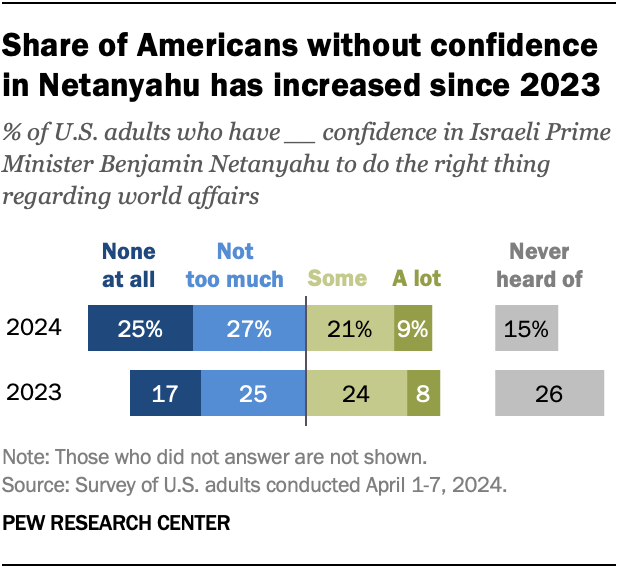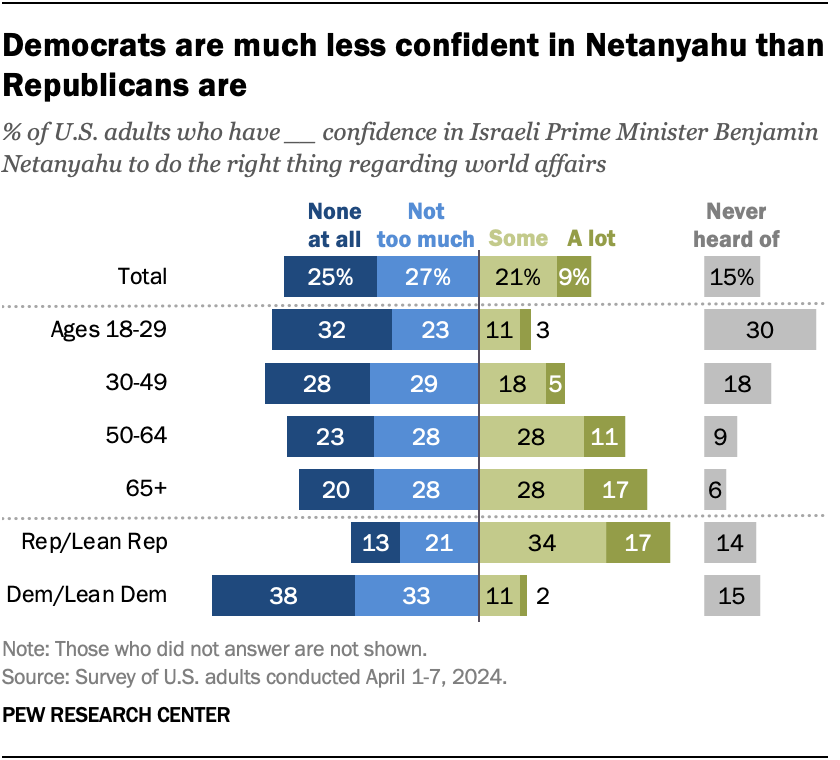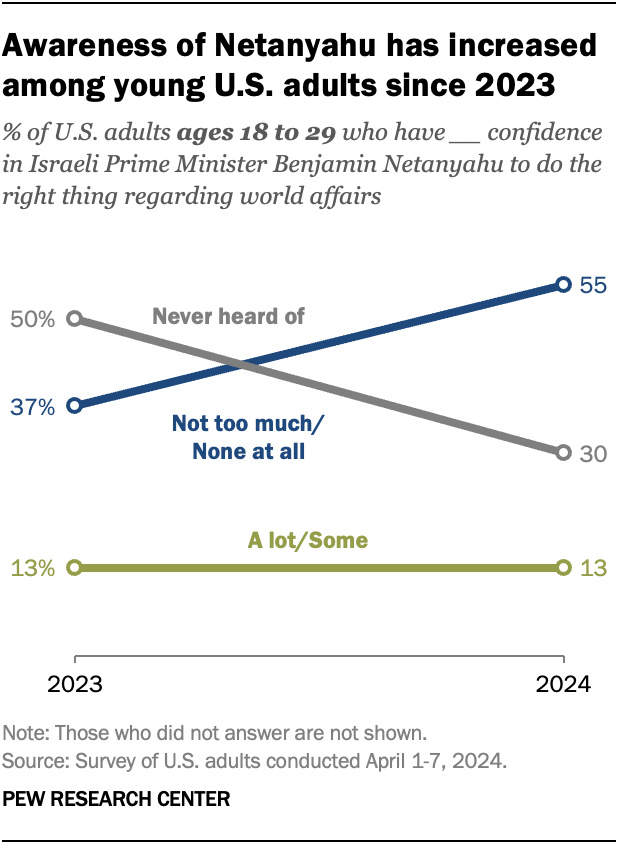
A majority of Americans (53%) have little or no confidence in Israeli Prime Minister Benjamin Netanyahu to do the right thing regarding world affairs, including 25% who have no confidence in him at all. Three-in-ten say they have at least some confidence in him, according to a Pew Research Center survey of 3,600 U.S. adults conducted April 1-7, 2024.

The share of Americans who have no confidence in Netanyahu has increased 11 percentage points since 2023. This includes an 8-point increase in the share who have no confidence in him at all.
This shift is related to a change in awareness of Netanyahu. In 2023, around a quarter of Americans (26%) said they had never heard of him, but that share has fallen to 15% this year.
Pew Research Center analyzed Americans’ attitudes toward Israeli Prime Minister Benjamin Netanyahu as part of our broader research about confidence in global leaders. Most of the data used in this analysis is from a survey of 3,600 U.S. adults conducted April 1-7, 2024. Data on views of the Israeli government is from a survey of 12,693 U.S. adults conducted Feb. 13-25, 2024.
Everyone who took part in the April survey is a member of Pew Research Center’s American Trends Panel (ATP), an online survey panel that is recruited through national, random sampling of residential addresses. This way, nearly all U.S. adults have a chance of selection. Read more about the ATP’s methodology.
Most of the respondents from the February survey (10,642) are members of Pew Research Center’s American Trends Panel. The remaining 2,051 respondents are members of three other survey panels – Ipsos’ KnowledgePanel, SSRS’s Opinion Panel, and NORC at the University of Chicago’s AmeriSpeak Panel – who were interviewed because they identify as Jewish or Muslim.
The February survey “oversampled” (i.e., interviewed a disproportionately large number of) Jews and Muslims to provide more reliable estimate of their views on the topics covered in the survey. But these groups are not overrepresented in the national estimates reported as we adjusted for the oversampling in the weighting of the data.
Both surveys are weighted to be representative of the U.S. adult population by gender, race, ethnicity, partisan affiliation, education, religious affiliation and other categories.
Here are the questions used for this analysis, along with responses, as well as the February survey methodology and the April survey methodology.
Americans’ views of Netanyahu differ by party and by certain demographic factors:
Partisanship

Republicans and Republican-leaning independents have much more positive views of Netanyahu than Democrats and Democratic leaners do. Around half of Republicans (51%) say they have at least some confidence in him to do the right thing regarding world affairs, while only 13% of Democrats say the same. Among Democrats, many more say they have no confidence in him at all (38%) than report even having some confidence in him.
Conservative Republicans (62%) are twice as likely as moderate and liberal Republicans (31%) to say they have at least some confidence in Netanyahu. Conservative and moderate Democrats (17%) also express more confidence than liberals (7%).
There are also age differences among partisans. For example, Republicans ages 50 and older have much more confidence in Netanyahu than younger Republicans do (69% vs. 33% have at least some confidence). Age differences are more modest among Democrats: 16% of older Democrats have confidence in the Israeli prime minister, compared with 10% of younger Democrats.
Among both Republicans and Democrats, the share expressing little or no confidence in Netanyahu has increased since last year. However, the shift among Democrats (+15 points) has been three times as large as the shift among Republicans (+5 points).
Age

Older Americans are significantly more likely than younger ones to have positive views of Netanyahu. About four-in-ten Americans ages 50 and older (42%) have at least some confidence in him to do the right thing regarding world affairs. That compares with around a quarter of those ages 30 to 49 and only 13% of adults under 30.
The youngest U.S. adults have grown more negative toward Netanyahu since last year. The share of adults under 30 who have little or no confidence in Netanyahu has risen from 37% then to 55% today. This is related, in part, to the 20-point decrease in the share of young adults who say they have never heard of Netanyahu.
Views of the Israeli government
Americans’ views of the Israeli government have also turned more negative since 2022, according to a Center survey conducted this February. About four-in-ten Americans (41%) have a favorable view of the Israeli government, down from 47% in 2022 and on par with the share who said this in 2019. Notably, the 2022 survey was the only one to take place when Netanyahu was not in office.
As with Netanyahu, when it comes to evaluations of the Israeli government, Republicans have much more favorable views than Democrats (63% vs. 24% favorable), and older Americans have more positive views than younger ones.
Note: Here are the questions used for this analysis, along with responses, as well as the February survey methodology and the April survey methodology.

